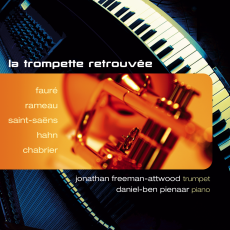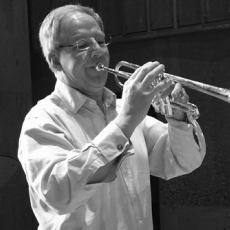La trompette retrouvee - Classicstoday.com
Artistic Quality - 10/10
Sound Quality - 10/10
We don't review a lot of trumpet/piano recordings here at Classicstoday.com. It's not just an issue of relative appeal to listeners and collectors; it has as much to do with the suitability for solo chamber music of an instrument with such an inherently "assertive" timbre and relatively limited expressive range due to its typically acuate manner of articulation. In other words, the very things that make a trumpet a trumpet do not necessarily wear well on the ear during an hour-long solo recital, so the prospect of detailed listening doesn't necessarily come readily. The dearth of original solo-trumpet classical repertoire is simply a reflection of the instrument's more varied and agreeable functions as an ensemble voice, uniquely punctuating, coloring, and occasionally shining in solo glory.
That said, this is one of those recordings that makes you pay attention even if you're not exactly a trumpet fan; right from the beginning the piano sounds so astonishingly realistic and present (not atypical for a Linn project), and the trumpet follows so crisp and snappy that you have to stay around to hear what happens next. The straightforward, declamatory style of Rameau's Suite from Nais (arranged by pianist Daniel-Ben Pienaar) is perfectly suited to Jonathan Freeman-Attwood's sound and technique--invariably bright and sharply articulated--and, with its variety of movements, the work proves a perfect recital opener. The following A Chloris by Reynaldo Hahn--a Baroque-style Largo--is a lovely, gently flowing change-of-pace that shows Freeman-Attwood's warmer, lyrical side.
Although the trumpeter's arrangement of Fauré's Second Violin Sonata Op. 108 is supposed to be the highlight of the program (and Freeman-Attwood provides interesting details regarding the arrangement and relative interpretive decisions), this meandering, busy, often craggy and difficult piece seems more involving and exciting for the performer than engaging for the listener. However, you have to admit that Freeman-Attwood and Pienaar niftily nail down every edge and corner and rip through every challenging passage without fear or fault. It is a very impressive performance, but this is where the ear is really challenged.
For me, the highlight is Pienaar's arrangement of a suite drawn from piano music by Emmanuel Chabrier. The fluid, sometimes jazzy melodies, the easy chromaticism, playful punctuations, and perfectly integrated piano, which in this context is absolutely equal to the trumpet, capture the best elements of this tricky, nearly incompatible combination of instruments. There's much to enjoy here, especially for serious trumpet music collectors--but even if you're not, be assured that this decidedly unconventional and intelligently produced recital represents modern trumpet-playing--and programming--at its best.

